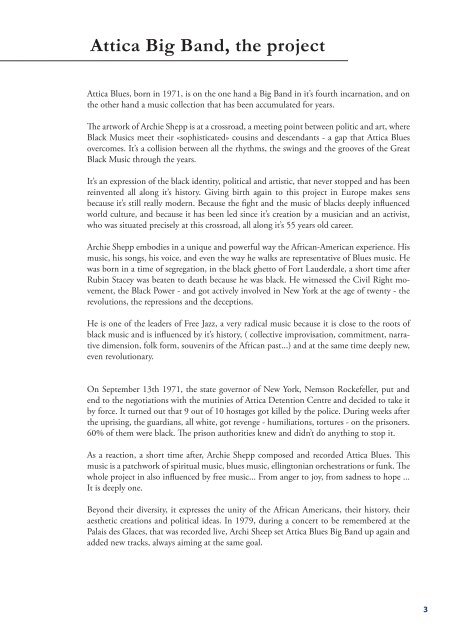Attica Blues Big Band, the project - Planete-Aurora
Attica Blues Big Band, the project - Planete-Aurora
Attica Blues Big Band, the project - Planete-Aurora
Create successful ePaper yourself
Turn your PDF publications into a flip-book with our unique Google optimized e-Paper software.
<strong>Attica</strong> <strong>Big</strong> <strong>Band</strong>, <strong>the</strong> <strong>project</strong><br />
<strong>Attica</strong> <strong>Blues</strong>, born in 1971, is on <strong>the</strong> one hand a <strong>Big</strong> <strong>Band</strong> in it’s fourth incarnation, and on<br />
<strong>the</strong> o<strong>the</strong>r hand a music collection that has been accumulated for years.<br />
The artwork of Archie Shepp is at a crossroad, a meeting point between politic and art, where<br />
Black Musics meet <strong>the</strong>ir «sophisticated» cousins and descendants - a gap that <strong>Attica</strong> <strong>Blues</strong><br />
overcomes. It’s a collision between all <strong>the</strong> rhythms, <strong>the</strong> swings and <strong>the</strong> grooves of <strong>the</strong> Great<br />
Black Music through <strong>the</strong> years.<br />
It’s an expression of <strong>the</strong> black identity, political and artistic, that never stopped and has been<br />
reinvented all along it’s history. Giving birth again to this <strong>project</strong> in Europe makes sens<br />
because it’s still really modern. Because <strong>the</strong> fight and <strong>the</strong> music of blacks deeply influenced<br />
world culture, and because it has been led since it’s creation by a musician and an activist,<br />
who was situated precisely at this crossroad, all along it’s 55 years old career.<br />
Archie Shepp embodies in a unique and powerful way <strong>the</strong> African-American experience. His<br />
music, his songs, his voice, and even <strong>the</strong> way he walks are representative of <strong>Blues</strong> music. He<br />
was born in a time of segregation, in <strong>the</strong> black ghetto of Fort Lauderdale, a short time after<br />
Rubin Stacey was beaten to death because he was black. He witnessed <strong>the</strong> Civil Right movement,<br />
<strong>the</strong> Black Power - and got actively involved in New York at <strong>the</strong> age of twenty - <strong>the</strong><br />
revolutions, <strong>the</strong> repressions and <strong>the</strong> deceptions.<br />
He is one of <strong>the</strong> leaders of Free Jazz, a very radical music because it is close to <strong>the</strong> roots of<br />
black music and is influenced by it’s history, ( collective improvisation, commitment, narrative<br />
dimension, folk form, souvenirs of <strong>the</strong> African past...) and at <strong>the</strong> same time deeply new,<br />
even revolutionary.<br />
On September 13th 1971, <strong>the</strong> state governor of New York, Nemson Rockefeller, put and<br />
end to <strong>the</strong> negotiations with <strong>the</strong> mutinies of <strong>Attica</strong> Detention Centre and decided to take it<br />
by force. It turned out that 9 out of 10 hostages got killed by <strong>the</strong> police. During weeks after<br />
<strong>the</strong> uprising, <strong>the</strong> guardians, all white, got revenge - humiliations, tortures - on <strong>the</strong> prisoners.<br />
60% of <strong>the</strong>m were black. The prison authorities knew and didn’t do anything to stop it.<br />
As a reaction, a short time after, Archie Shepp composed and recorded <strong>Attica</strong> <strong>Blues</strong>. This<br />
music is a patchwork of spiritual music, blues music, ellingtonian orchestrations or funk. The<br />
whole <strong>project</strong> in also influenced by free music... From anger to joy, from sadness to hope ...<br />
It is deeply one.<br />
Beyond <strong>the</strong>ir diversity, it expresses <strong>the</strong> unity of <strong>the</strong> African Americans, <strong>the</strong>ir history, <strong>the</strong>ir<br />
aes<strong>the</strong>tic creations and political ideas. In 1979, during a concert to be remembered at <strong>the</strong><br />
Palais des Glaces, that was recorded live, Archi Sheep set <strong>Attica</strong> <strong>Blues</strong> <strong>Big</strong> <strong>Band</strong> up again and<br />
added new tracks, always aiming at <strong>the</strong> same goal.<br />
3


